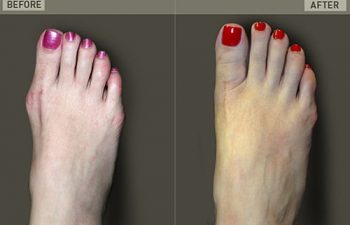Four Potential Reasons for the Development of Bunions

Bunions appear when bones in the foremost part of your foot become misaligned. Your big toe moves closer to, or even overlaps the other toes, forcing the hallux metatarsal phalangeal – or joint of the big toe – to protrude. The resulting bump on the side of the foot is a bunion. A bunion might appear like rough, hard skin, or can become red, inflamed and painful. Smaller protrusions, known as bunionettes, may appear at the base of the little toe.
Although the exact cause of bunions is unknown, experts agree that there are several factors that are likely to increase the risk of developing this condition.
Poorly Fitted Shoes
Footwear that is ill-suited to the shape of your feet can force toes together and increase pressure on the bones of the foot. Even if shoes do not feel uncomfortable when worn, constant additional pressure on the delicate phalanges builds up over time, possibly increasing the chance of developing bunions. Many people are inadvertently choosing footwear that is too tight or too narrow. Consistently wearing shoes with pointed toes is another contributing factor to the growth of bunions.
High Heeled Shoes
Although high heels are a fashion staple, they force the wearer to balance more of their weight on the front of the foot. Effectively standing on tip-toe for long periods of time crams the toes together at the front of the shoe. Foot bones may naturally attempt to adjust to the rigors of wearing high heels, causing them to permanently reposition.
Rheumatoid Arthritis
While most commonly seen afflicting the hands, knees or ankles, rheumatoid arthritis is believed to be a contributing factor in the development of bunions. Rheumatoid arthritis is an autoimmune disease that attacks the fluid around joints, causing pain and inflammation.
Family History
The inherent structure and shape of your foot may contribute to the risk of bunions. The structure of your foot is often determined by family genetics. Take care with your footwear choices if you have a family history of bunions.
If bunions are causing you discomfort, Dr. Mogul at Foot Surgery Center NYC can find a treatment tailored to your lifestyle. Call today for a consultation.
Posted on behalf of
1111 Park Avenue Suite 1B
New York, NY 10128
Phone: (212) 769-0066
Email: [email protected]
Monday - Friday 8:30 AM – 6:00 PM
